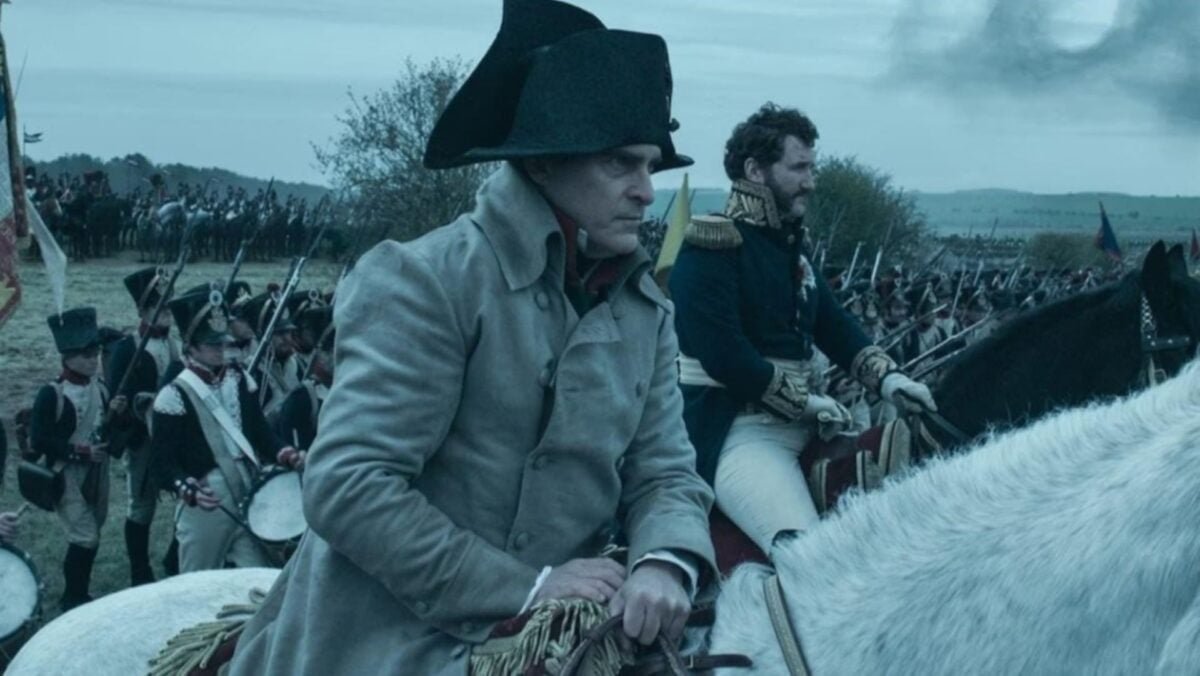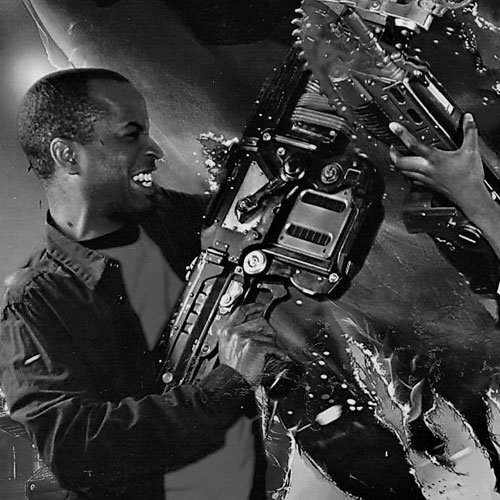When one utters the words “Napoleon Bonaparte,” several words immediately spring to mind, not all of them complimentary. “Genius,” “tyrant,” “revolutionary,” “strategist,” and “dictator” are just a few of them. But one thing that cannot be disputed is that the famous general was a fascinating individual who rose from almost entirely out of nowhere to become France’s first emperor and eventually control much of Western Europe for 15 years. As was the case with countless filmmakers before him, Napoleon (2023) is famed director Ridley Scott’s visually spectacular attempt to preserve his own vision of Napoleon’s exploits in celluloid.
Starring Joaquin Phoenix (Gladiator, Joker) as the titular emperor, the film chronicles Napoleon’s rise and fall, from his first major victory at the Siege of Toulon as a young, ambitious artillery commander right up to his final defeat at The Battle of Waterloo as Emperor of France, as well as its consequential aftermath.
The movie’s beating heart, however, is unmistakably the romance between Napoleon and his first wife, Josephine. Here, director Ridley Scott seems to embellish to make Napoleon’s love for Josephine (played by Vanessa Kirby) the motivating force behind almost every action he takes, provided it doesn’t supersede his other two loves, France and the army (Napoleon’s last words on his deathbed were “France,” “army,” “head of the army,” and “Josephine”).
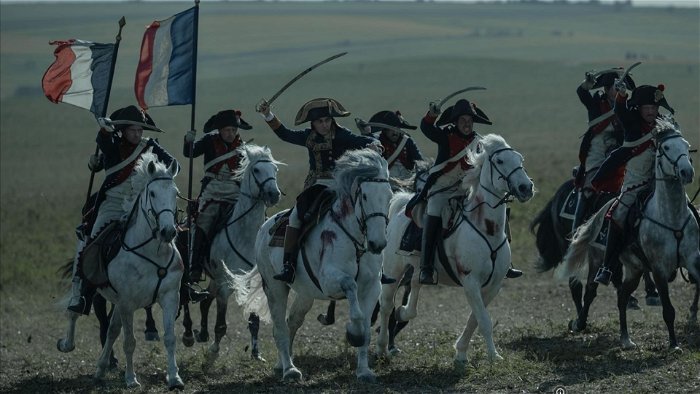
Phoenix and Kirby share a great on-screen chemistry that, on an emotional level, portrays Napoleon and Josephine as intellectual equals. Still, even without knowing their fates, it becomes clear early on that Josephine is the one in control of the relationship, no matter how high Napoleon’s star rises. Their relationship is messy, abusive, and riddled with infidelities both seen and unseen, and the pressure on the couple to produce an heir, not only from Napoleon’s mother but also from his advisors, leads to vicious arguments between them. As ugly and disturbing as these scenes are, they also feel quite modern and relatable to 21st century audiences.
“Napoleon Bonaparte was a fascinating individual who rose from almost entirely out of nowhere to become France’s first emperor and eventually control much of Western Europe for 15 years.”
That said, it is a bit of a stretch to buy into the film’s characterization of Napoleon and Josephine as “soul mates,” especially when their relationship is presented as one of selfish co-dependency. Dress it up all you want, but Josephine is effectively a woman held in a gilded cage, whom Napoleon sees primarily as a romanticized sexual object and a means of producing an heir. Meanwhile, Napoleon represents financial security for Josephine as well as her children from a previous marriage, who are rarely seen. They seem to love each other genuinely, but it’s hard to imagine their romance still exists under different circumstances.
Reportedly, director Ridley Scott was so impressed by Phoenix’s turn as Joker in Todd Phillip’s 2019 film of the same name that “Joaquin was always the man” when he set out to cast the role Napoleon, and now having watched the film, it’s very easy for me to see why. Phoenix’s unquestionable depth of experience in exploring complex, mercurial characters makes him the perfect muse.
Numerous and often conflicting historical accounts regarding Napoleon’s personality have described him as “ruthless,” “misogynistic,” and “cruel” but also “compassionate,” “romantic,” and “a realist.” Phoenix masterfully succeeds in distilling all of these qualities into a humanizing portrayal of the infamous French leader who doesn’t shy away from exposing his vulnerabilities.
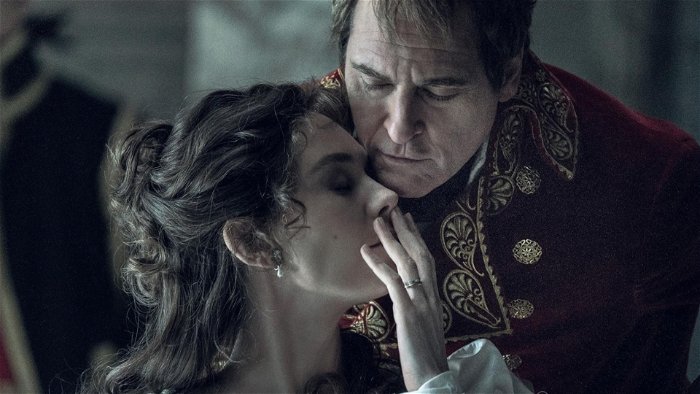
For instance, we get to see an anxious, wet-behind-the-ears Napoleon fighting alongside his troops under the cover of night during the violent Siege of Toulon, issuing his commands through panicked breaths and appearing so terrified that he might retreat but pushing through the fear to execute his plan because the failure of his ambitions would be a fate far worse than death. These are sentiments that Phoenix’s acting captures brilliantly.
Later in the film, we see Napoleon join forces with his younger brother Lucien (played by Matthew Needham) during the bloodless Coup d’état of 18 Brumaire to narrowly avoid being trampled by the ruling Directory government members and The Council of Five Hundred. Feigning their super-patriotism, Napoleon and Lucien convince the French troops outside to march in and arrest members of the Directory instead, allowing Napoleon to solidify his power and become the de facto ruler of France. It’s a tense but ultimately lighthearted and cartoonish scene that leverages Phoenix and Needham’s comedic timing but never descends into actual caricature.
“Phoenix and Kirby share a great on-screen chemistry that, on an emotional level, portrays Napoleon and Josephine as intellectual equals.”
Finally, there are the seemingly spontaneous utterances by Phoenix that appear to be played for laughs but also suggest a level of awkwardness and immaturity when Napoleon interacts with other people, like clicking his tongue incessantly when signalling to Josephine that he’s in the mood, or while face-to-face with a British Navy commander he issues a fearsome threat only to then undermine it with the childish follow-up: “You think you’re so great just because you have ships!” Phoenix could probably have gotten away with just smouldering and scowling menacingly between his lines for most of the film, but his playfulness with the role elevates it.
Shockingly, despite a meaty 157-minute runtime, Napoleon’s narrative moves quickly and doesn’t do a great job of introducing its key supporting characters. Occasionally, a name and title card will briefly flash on the screen below the character to quickly identify him or her to the audience, but more often than not, this occurs in the midst of important dialogue and is easily missed or forgotten. It doesn’t help either that the several important names are frequently tossed about long before their characters first appear on screen, further adding to the confusion when they finally appear.
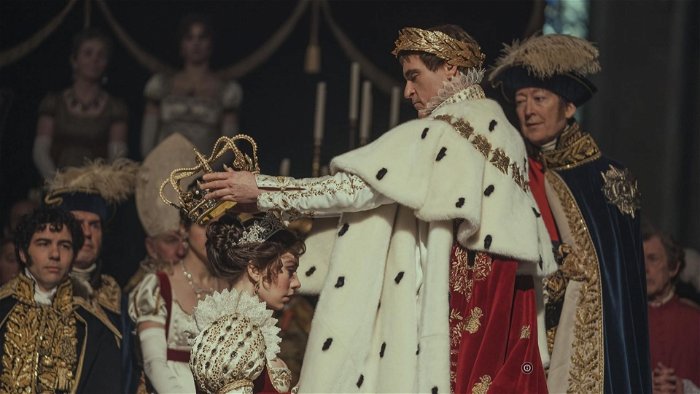
A big part of the problem is that Napoleon’s relationships with his allies, including French Directory member Paul Barras, advisor Tallyrand and his own brother-turned-politician Lucien, aren’t well-fleshed out at all, nor are they given enough screen time to help audiences properly establish in their minds who they are, what they represent and why Napoleon is listening to and/or working with them.
Even after spending the day leading up to the screening boning up on my Napoleonic history, I still had difficulty keeping all the names, faces, and events straight, so I can only imagine newcomers will be even more confused.
“Phoenix masterfully succeeds in distilling all of these qualities into a humanizing portrayal of the infamous French leader who doesn’t shy away from exposing his vulnerabilities.”
Thankfully, it’s not necessary to understand every character’s relationship in Napoleon to enjoy Ridley Scott’s epic, visceral recreations of Napoleon’s greatest battles, which are arguably the show’s true stars. While a handful of scenes are certainly not for the faint of heart, watching Napoleon’s strategies unfold as battle formations actively flank, encircle and clash with each other in an orchestrated dance of death is mesmerizing, even if one loses their bearings momentarily and forgets which army is wearing which funny hat.
It’s important to recognize that the last theatric film to star Napoleon was 1970’s Waterloo, which was focused solely on that one battle alone. Not only have film production values improved drastically over past 50 years in visual and audio fidelity since then, but wherever possible, while filming Napoleon, Scott eschewed CG for practical effects, so a shot depicting 300 soldiers and 100 horses in battle isn’t just implied, it’s real.
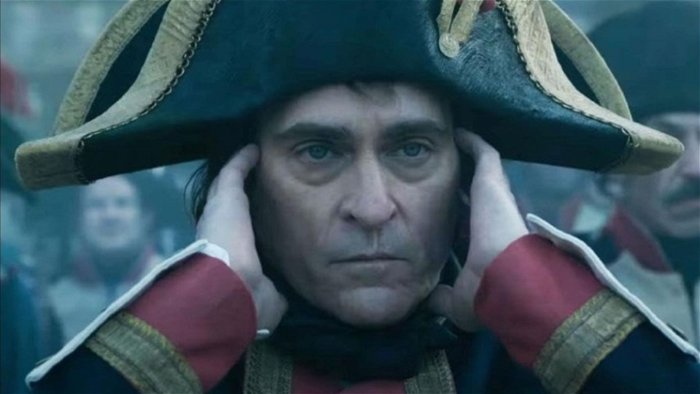
My one complaint here is that while the film’s battle sequences, particularly those of Toulin, Austerlitz and of course, Waterloo, are all impressively directed by Scott, sumptuously photographed by DP Dariuz Wolski, and presented on a grand scale well worth experiencing on the largest IMAX screen one can access, I’m disappointed that at no point does the film attempt to provide a visual glimpse into Napoleon’s strategic mind.
Several of the Emperor’s tactical hallmarks are no doubt on display: using the element of surprise, swiftly outflanking enemy forces through breakneck speed marching marches and a heavy yet calculated use of artillery. But I’d gladly sat through another 10-20 minutes to experience what might have been happening in Napoleon’s head as he executed his battle plans in real-time. Admittedly, though, such a change would probably have resulted in a more cerebral film that fewer people would be interested in watching.
History buffs, war film aficionados and fans of visual spectacle alike should absolutely make the effort to view Ridley Scott’s Napoleon on the big screen. A little reading up on Napoleonic history (psst! Wikipedia) before viewing is advised to keep newbies from getting lost in 18th Century French politics, but Joaquin’s nuanced performance as Napoleon and the romance he shares with Kirby’s Josephine provides enough of a breadcrumb trail to keep viewers engaged in the overall story until they regain their footing.
